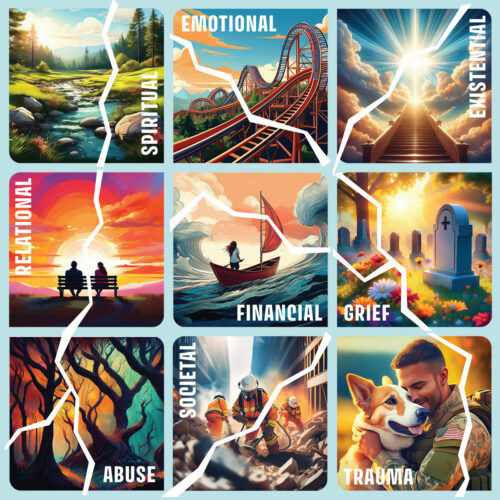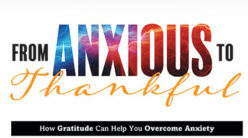
A broken bone hurts, but so does a broken heart. Our minds and bodies carry a variety of pains, many that aren’t physical. Once we recognize these other forms of pain, we can begin to heal.
I don’t know how many times my mother said I was a pain in her neck. I knew what she meant, of course. I never hurt her physically, but I know I caused her pain in other ways.
Over 38 years of work in hospice chaplaincy and pastoral care, I came to better understand the other types of pain that my mother must have been talking about. Most pain does not reveal itself willingly but seeps out in complaints and fears. Giving a name to those pains is rare since we act like they are separate from what we typically think of as pain, which is physical pain.
These other types of pain are more likely to rise to the surface at certain times, including during the holiday season and at the end of one’s life.
A Painful Time of the Year
Holidays are meant for celebrating. Fun and food and family, special memories. For many years, Christmas kept its magic for me, although I stopped wanting so many gifts as time went on. Christmas set me up to have a good year and to look forward to the next Christmas.
The same feeling ran through my whole family. It carried my mother right into her 84th year, and she made it to her last Christmas and died the next day. She would not be denied her tradition of food and family and merrymaking, even if her spirit was nearly gone.
I can’t remember my childhood years feeling dark or sad around the holidays. They were bright and cheery. But today, it is quite common to hear people express their dislike of the holiday season. They might be widowed or their children are far away. They might feel all alone and have little interest in life, nothing to do and nowhere to go.
These are types of pain, even though we don’t call them pain. When we face these pains and begin to heal, a whole new way of living through our pain can bring revival to our hearts.
Understanding Pain
When someone says something cruel, we often respond by saying “Ouch!” or “That really hurts.” It wasn’t physical pain, but still painful. These are pains in our heart, mind, and soul. And they are healable. When we understand this, much of our distress can be relieved, and it will likely have a positive effect on our physical health as well.
When we are experiencing total health, all of our cylinders fire in rhythm and power. Yet there are days when something is off and you just can’t identify it or seem to fix it. Knowing that these types of pain exist can help. Once you know what kind of pain you’re experiencing, you’ll be able to use the right tools for healing.
Spiritual Pain
Many of my hospice clients suffered from spiritual pain. They rarely could come right out and say, “Chaplain Marty, I’m suffering from spiritual pain. Can you help me?” Yet their comments about life beyond death or their uncertainty about God’s love for them gave me clues that they were suffering the lesser-known type of pain we call spiritual pain. As a chaplain, this was my field of care, my specialty.
Spiritual pain can feel like an emptiness in the soul or the feeling that you are unloved or unlovable.
Finding God gives healing to that emptiness in your soul and assures you that someone really loves you. There is a lot of spiritual healing in the Scriptures, especially the Psalms. Meaningful answers to distress and uncertainty often come from clergy or family members who are well versed in Scripture.
Emotional Pain
This type of pain occurs when your emotions take over your mind and body, hijacking your courage, leaving you fearful. You aren’t sure how to move forward or whether you even want to move forward at all.
Counselors, mental health practitioners, and wise friends and advisors can help here. Understanding yourself and why your emotions feel like a roller coaster will help you return to balanced emotions and will offer hope for the future.
Existential Pain
Was my life worth it? What do I have to show for it? Did I accomplish anything important? These are the questions many people ask about why they are here. Toward the end of their lives, people may also fear death and the uncertainties surrounding it.
I have found the Bible is up to the task in this area of healing. The study of wisdom, religion, and philosophy can aid with existential pain.
Relational Pain
This pain can be felt at any point in life when a relationship with a family member or friend breaks down. Your heart can feel like it is breaking as someone pulls away from you and you grow more distant from each other. In some cases, we don’t know how to heal from the wounds our relatives or friends inflicted on us or the wounds we inflicted on them.
Chaplains, social workers, clergy, and counselors can all help heal relational wounds and even bring family members and friends back into a relationship, when appropriate.
Financial Pain
Financial pain is that ominous feeling that you won’t have enough money. It could be questions such as “How will I pay my bills?” or “Is inflation going to get worse?” or a hundred other thoughts about keeping your head above water and providing for your family.
I’ve seen social workers and financial counselors take the lead in this area and give great financial advice. Reversing financial pain requires becoming debt free and learning to spend and invest wisely.
Grief Pain
Loss, as a form of pain, is often carried in one’s heart as grief for many years. If it is uncared for or misunderstood, loss eats away at our courage to live. We sense the pain of loss by the ache in our soul, the listlessness we feel from day to day, the wish that our loved one was still with us.
To begin to heal, you must face the loss rather than deny it. Bereavement groups, telling stories about your loved one, and learning to navigate life knowing they are not by your side but are still in your heart will help bring you back to life. Clergy often excel at understanding this pain and can help in your bereavement.
Abuse Pain
Abuse from key figures in your early life often shapes the relationships of your adult life. In recent years, we’ve come to understand a lot more about the various types of abuse, such as physical, spiritual, mental, sexual, and verbal.
Counselors who specialize in abuse and trauma care are especially helpful here. There are also excellent resources for the spouses of people who have been abused, to help them become a part of the healing journey without compounding the pain.
Societal Pain
Societal pain is the sense that the community is experiencing upheaval and disruption. The uneasiness this creates in us is hard to quantify but turns into a major part of our conversations, daily concerns, and sense of uncertainty.
Make a full recalibration of how you receive information, wisdom, and advice. Consider how much information you’re consuming, whether the sources are trustworthy, and if you’re exposing yourself to too much doom and gloom and not enough hopeful messaging.
Trauma Pain
Post-traumatic stress disorder (PTSD) is common among the military/veteran community, but civilians can also suffer from it as a result of childhood traumas.
This is specialized pain that requires good care from our medical community, especially the Veterans Administration. There are well-trained counselors and doctors that will help with PTSD, and the therapies they offer are meeting with good success in many cases.
Overall, healing for all these types of pain can be found in a variety of places, including good counselors, nature, wisdom from Scripture, and friends or family members who offer trusted advice or who have been through what you are going through.
The Bible also offers a storehouse of healing words. According to Proverbs 4:22, the words of Scripture help us heal and “they bring health to the whole body” (NCV).
After 38 years of ministry and chaplaincy, Marty Thurber is retired in Lincoln, Nebraska. Every morning at sunrise, you’ll find him, his wife, and their dogs walking around the local lake.






